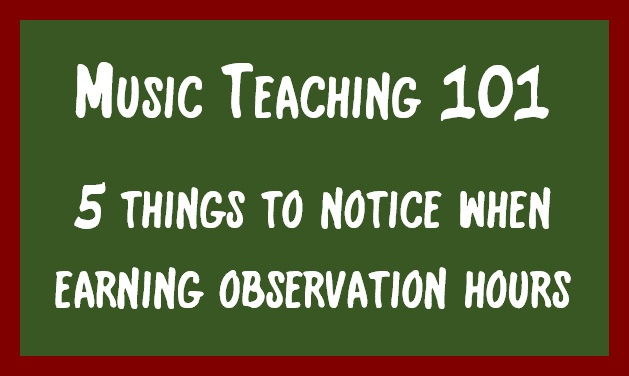When I was in college, I wish I had understood the value of an observation.
Before I started teaching I had to spend hours and hours observing in a “live” school setting. I was working toward my Bachelor of Music degree with a K-12 certification in choral music. More than anything, I wanted to see the really cool stuff. I wanted to see a high school choir rehearsing their contest music. I wanted to see elementary students playing instruments and games. Sadly, it was not to be…. in fact, when I was faced with the actual observations, I endured them rather than experienced them simply because they weren’t what I had hoped for.
- I spent time observing reading teachers doing running records as part of her reading class.
- I spent time observing math centers in action.
- I spent time in a 6th grade choir class with 95 students who were learning to sing “I believe I can fly” except they that isn’t what they sang…. instead spoke “Ikaahh fly”.,,,,,over and over and over again…….without correction……
- I spent time in an elementary school where the music teacher had been told that instead of music they were supposed to teach phonics…. so even though the students only had music 30 minutes a week, 15 minutes of each lesson was spent singing a, aah, apple…. b, buh, banana….. exciting stuff. This made me a little crazy because the other 15 minutes of the lesson were really outstanding and I left always wishing I could see more.
- I even spent time in an early childhood music classroom where the music class had 3 classes at a time!!!!!! YIKES! 3 classes of pre-k alone with the music teacher!!!!!
2. If you only have a very narrow exposure during observations it will be very difficult for you to contextualize anything. Music teacher hopefuls benefit from observing in the regular classroom. Without it, your only idea of what goes on in a regular classroom is what you remember from childhood…. Things have changed! Music teacher hopefuls benefit from observing in less that perfect musical settings because in real life there are a lot more music teachers who teach in settings that are far from perfect than those folks who have the dream settings.
3. You can seek out observation hours on your own. Your semesters are not on the same schedule as ours….So when you are home sometime, contact your old music teacher and set up an observation.
No matter what subject area, or setting you are told to observe, if you are prepared for your observation, then any observation can be turned into pure GOLD!
The golden observations happen when you realize that the real power behind any observation is not about the subject matter or setting at all….. An observation is best viewed in light of how the people in the room are behaving and how they are interacting with each other, their environment and their task.
1. Notice the children – Who are these creatures? The BEST way to be a good teacher is to understand who your students are.
- Are they enthusiastic?
- Are they interested?
- Are they on task? If they are not on task, can you identify a cause? (i.e. time of day, seating arrangement)
- If redirection is needed, what sort of redirection do they respond to?
- How do they interact with the teacher?
- How do they interact with their peers?
- What seems to motivate them?
- What humors them?
- What frustrates them?
- How does the teacher speak to the children?
- Does the tone used, elicit the desired response?
- What is this teacher doing that works?
- What routines are in place that help facilitate a smoothly run class?
- If the lesson starts to veer off track, or gets stuck….what does the teacher do to keep things moving?
- What adjustments does the teacher make?
- How does the teacher address discipline issues?
- Is the room well lit and of comfortable temperature?
- How has the teacher addressed these issues if they are not optimal?
- Is the room cluttered or neat? Are the students able to navigate easily?
- Can they find the items that they use?
- If another person enters the room, what is their impact on the overall focus?
- What sorts of things are posted in the room that the students or the teacher actually refer to
- What sorts of things are posted in the room that seemingly have no purpose?
- What is the culture of the classroom?
- How does the teacher include everyone?
- How do the children treat each other?
- Are tasks released to the students or is the teacher doing all of the work?
- What questioning strategies does the teacher use to keep everyone invested in the lesson?
- What jobs and responsibilities do the students have in order to facilitate the class culture? (i.e. line leader, or study buddy)
- What transitions worked best?
- What activities worked best?
- Where was the source of motivation?
- What strategies were used to facilitate independent practice?
- What methods were used to help students demonstrate their knowledge?

